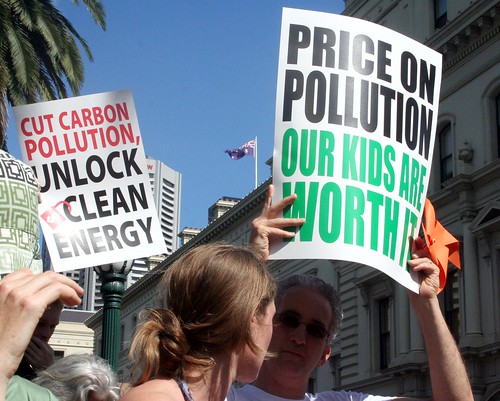 by Brad Farrant, University of Western Australia
by Brad Farrant, University of Western AustraliaDespite a capacity crowd and a stellar cast neither the media nor the Coalition turned up to the climate change election forum in Perth last night.
Liberal MP Dr Dennis Jensen who refutes the scientific consensus was booked in to attend but pulled out.
A concerted effort by the organisers failed to find a single Coalition politician or candidate willing to attend and present their policies. The mainstream media was also conspicuously absent.
Unfortunately this is indicative of how much the media and the Coalition are not fair dinkum about climate change.
Climate change is the biggest global health threat of this century. The Climate Commission has recently reminded us that this is the critical decade for action if we are to prevent dangerous climate change.
Because of the potential to undo previous gains and set national and international efforts on climate change back many years this is shaping up to be the most important election in our children’s futures.
Our politicians and journalists have an ethical duty to ensure that we protect the health and wellbeing of the children of today and tomorrow from dangerous climate change.
Despite the fact that he previously declared that the science behind climate change was “crap” along with his more recent dog whistle to climate science deniers, the fact that his chief business advisor refutes the scientific consensus and that other senior coalition figures continue to deny the science, Tony Abbott now says that the coalition accepts the science and is “fair dinkum” about addressing climate change.
Furthermore, on the weekend Mr Abbott’s message to voters was that the election should be about who they think is more “fair dinkum” and can deliver results instead of being all talk.
This is a remarkable position from a man who ousted former opposition leader Malcolm Turnbull because of the latter’s support for action on climate change.
At the time Malcolm Turnbull said that the “Liberal Party is currently led by people whose conviction on climate change is that it is “crap” and you don’t need to do anything about it. Any policy that is announced will simply be a con, an environmental figleaf to cover a determination to do nothing.”
Whether you believe Malcolm or not, few would dispute that Tony Abbott’s tactics since his elevation to opposition leader have played a major role in decreasing public support for action on climate change as well as the government’s recent axing of the ‘carbon tax.’
Over the last 24 hours the mainstream media has once again uncritically reported Tony Abbott’s assertion that this election is about the ‘carbon tax.’ This has been given massive coverage in all forms of media.
How is it that Mr Abbott can make the election about climate change policy and yet largely avoid rigorous journalistic analysis of his own climate change policy?
The opposition’s direct action plan has been criticised by experts ever since it was announced with 85% of economists saying that the direct action plan is not sound economic policy and few believing it will actually work.
More recently a number of separate analyses have also highlighted the major inadequacies in the opposition’s direct action plan.
Although the existing government policies fall well short of committing Australia to do its fair share to prevent dangerous climate change, the opposition’s policies are far worse and only stand because the media is abetting them.
With a handful of notable exceptions (see the links in this piece for some examples) the Australian media is failing to inform the public about the urgency of action that is required to protect the children of today and tomorrow from dangerous climate change or of the relative merits of the policies being put forward in this election.
Brad Farrant does not work for, consult to, own shares in or receive funding from any company or organisation that would benefit from this article, and has no relevant affiliations.
This article was originally published at The Conversation. Read the original article.
No comments:
Post a Comment